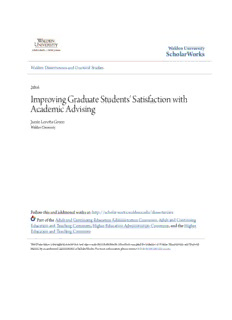
Improving Graduate Students' Satisfaction with Academic Advising PDF
Preview Improving Graduate Students' Satisfaction with Academic Advising
Walden University ScholarWorks Walden Dissertations and Doctoral Studies Walden Dissertations and Doctoral Studies Collection 2016 Improving Graduate Students' Satisfaction with Academic Advising Jamie Loretta Green Walden University Follow this and additional works at:https://scholarworks.waldenu.edu/dissertations Part of theAdult and Continuing Education Administration Commons,Adult and Continuing Education and Teaching Commons,Higher Education Administration Commons, and theHigher Education and Teaching Commons This Dissertation is brought to you for free and open access by the Walden Dissertations and Doctoral Studies Collection at ScholarWorks. It has been accepted for inclusion in Walden Dissertations and Doctoral Studies by an authorized administrator of ScholarWorks. For more information, please [email protected]. Walden University COLLEGE OF EDUCATION This is to certify that the doctoral study by Jamie Green has been found to be complete and satisfactory in all respects, and that any and all revisions required by the review committee have been made. Review Committee Dr. Robert Hogan, Committee Chairperson, Education Faculty Dr. Kathryn Hollywood, Committee Member, Education Faculty Dr. Ioan Gelu Ionas, University Reviewer, Education Faculty Chief Academic Officer Eric Riedel, Ph.D. Walden University 2016 Abstract Improving Graduate Students’ Satisfaction with Academic Advising by Jamie L. Green MAT, The University of Memphis, 2009 BS, The University of Tennessee at Chattanooga, 2007 Doctoral Study Submitted in Partial Fulfillment of the Requirements for the Degree of Doctor of Education Walden University July 2016 Abstract Academic advising is associated with increased student retention and academic success. However, advising at an urban graduate school of education in Tennessee has been criticized for limited advisor availability, poor communication, and lack of advising knowledge. The purpose of this qualitative case study was to gain a deeper understanding of the reasons for student satisfaction or dissatisfaction and to identify techniques to improve academic advising. This study was guided by the conceptual frameworks of Kelly’s personal construct theory and Daloz’s psycho-developmental perspective. The research question addressed the perceived role of academic advisors that graduate students associated with academic success. The data were collected using 4 focus groups. Group 1 consisted of 10 graduate students; group 2 included 5 professors; group 3 was comprised of 2 advisors; group 4 consisted of 3 administrators. A thematic analysis was performed on the data, and member checking was used to improve data quality. Findings revealed that students were satisfied with the positive attitude of advisors, but were dissatisfied with advisors’ relational skills and knowledge of college programs. Findings also revealed that students, professors, and administrators were dissatisfied with advisor’s limited availability and lack of training. Based on these research findings, a 3-day professional development workshop for advisors was developed. The workshop included training about techniques to improve advisor communication skills and knowledge of effective advising practices. Implementation of this professional development workshop could bring about positive social change by improving the effectiveness of the advising program and the quality of graduates. Improving Graduate Students’ Satisfaction with Academic Advising by Jamie L. Green MAT, The University of Memphis, 2009 BS, The University of Tennessee at Chattanooga, 2007 Doctoral Study Submitted in Partial Fulfillment of the Requirements for the Degree of Doctor of Education Walden University July 2016 Dedication This doctoral project study is dedicated to my mother and my late grandparents. Thank you so much for the many years of love, support, and encouragement. I would also like to dedicate this to my friends who encouraged me along my educational journey. Acknowledgments I would like to acknowledge the members of my project committee; Dr. Hogan and Dr. Hollywood who kept me on the right track. I would also like to thank Dr. Swetnam, who probably knows me the best and has been with me from the very beginning of my first residency in Paris, France. I would also like to acknowledge all of my colleagues who motivated me in one way or another to accomplish my goals in life. My colleagues have assisted me in growing academically and professionally. Table of Contents List of Tables .......................................................................................................................v List of Figures .................................................................................................................... vi Section 1: The Problem ........................................................................................................1 Local Problem ................................................................................................................1 Rationale ........................................................................................................................4 Evidence of the Problem at the Local Level ........................................................... 4 Evidence of the Problem from the Professional Literature ..................................... 5 Definition of Terms........................................................................................................9 Significance of the Study .............................................................................................10 Research Questions ......................................................................................................13 Review of the Literature ..............................................................................................13 Conceptual Framework ......................................................................................... 14 Review of the Broader Problem ............................................................................ 19 Implications..................................................................................................................33 Summary ......................................................................................................................33 Section 2: The Methodology ..............................................................................................34 Qualitative Research Design and Approach ................................................................34 Pilot Study ....................................................................................................................38 Setting ..........................................................................................................................39 Role of the Advisor ......................................................................................................40 Participants ...................................................................................................................41 i Access to Participants ........................................................................................... 41 Protection of Participant Rights ............................................................................ 42 Students ................................................................................................................. 43 Professors, Administrators, and Advisors ............................................................. 43 Role of the Researcher .................................................................................................45 Data Collection ............................................................................................................46 Focus Groups ........................................................................................................ 46 Focus Group Coding ............................................................................................. 49 Data Analysis ...............................................................................................................50 Reliability and Validity ......................................................................................... 51 Limitations ...................................................................................................................53 Findings........................................................................................................................54 Conclusion ...................................................................................................................71 Section 3: The Project ........................................................................................................72 Introduction ..................................................................................................................72 Description and Goals of My Project...........................................................................72 Rationale ......................................................................................................................75 Review of the Literature ..............................................................................................76 Cultural Influence ................................................................................................. 77 Institutional Support for Academic Advisors ....................................................... 78 Assessment of Support .......................................................................................... 80 Summary of Literature Review ............................................................................. 81 ii Implementation ............................................................................................................81 Potential Resources and Existing Supports........................................................... 82 Potential Barriers .................................................................................................. 83 Proposal for Implementation and Timetable......................................................... 83 Roles and Responsibilities of the Researcher and Others ..................................... 84 Project Evaluation Plan ................................................................................................84 Implications Including Social Change .........................................................................85 Local Community ................................................................................................. 85 Far Reaching ......................................................................................................... 86 Conclusion ...................................................................................................................86 Section 4: Reflections and Conclusions .............................................................................88 Project Strengths and Limitations ................................................................................88 Recommendations for Alternative Approaches ...........................................................90 Scholarship ...................................................................................................................90 Project Development and Evaluation ...........................................................................93 Leadership and Change ................................................................................................93 Analysis of Self as Scholar ..........................................................................................94 Analysis of Self as Practitioner ....................................................................................95 Analysis of Self as Project Developer .........................................................................95 The Project’s Potential Impact on Social Change........................................................96 Implications, Applications, and Directions for Future Research .................................97 Conclusion ...................................................................................................................97 iii
Description: